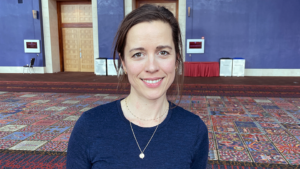Prof Francois Duhoux, medical oncologist at the Cliniques Universitaires Saint-Luc in Brussels reported on the third general session at SABCS 2023.
In the first part of his report, Prof Duhoux discussed updates of studies with CDK4/6 in the adjuvant setting for early breast cancer patients. The updated results from the NATALEE trial, investigating ribociclib’s addition to adjuvant endocrine therapy, were presented by Prof Hortobagyi. At a median follow-up of 33.3 months, a statistically significant difference in invasive disease-free survival was observed. At the 3-year mark, patients receiving ribociclib showed a 3.1% higher IDFS (90.7%) compared to those without ribociclib (87.6%), with a more pronounced impact in stage 3 disease. Distant disease survival exhibited a 2.7% difference at 3 years, while overall survival data is pending. No new safety concerns were identified. Notably, the monarchE study revealed consistent abemaciclib benefit on preselected signatures across breast cancer intrinsic molecular subtypes and in both high- and low-risk scores using inferred Oncotype-RNA signatures. The PALLAS study, incorporating palbociclib into adjuvant endocrine therapy, disclosed that 70% of patients were luminal A, providing novel insights into the patient profile for this treatment.
Dr. Loibl presented updated results from the KATHERINE study, focusing on patients with HER2-positive early breast cancer who did not achieve a pCR after neoadjuvant chemotherapy and anti-HER2 therapy. In this randomised trial, patients were assigned to either continue anti-HER2 therapy or switch to T-DM1. The final invasive disease-free survival (IDFS) analysis at a median follow-up of 8.4 years revealed a substantial difference. Those who received T-DM1 had an IDFS of 80.8% at seven years, compared to 67.1% in the control group, representing an impressive absolute benefit of 13.7%. Updated overall survival results, presented in the second interim analysis, demonstrated that at seven years, 89.1% of the T-DM1 group was alive, compared to 84.4% in the control arm, yielding an absolute overall survival benefit of 4.7%. These findings underscore the significant and enduring impact of T-DM1 in improving both IDFS and overall survival in this patient population.
The INAVO120 study focused on PIK3CA mutated ER+/HER2- metastatic breast cancer patients progressing on or within 12 months of adjuvant endocrine therapy. The randomised trial compared inavolisib or placebo combined with palbociclib and fulvestrant. The baseline characteristics were similar, and the PFS analysis revealed a significant difference, with inavolisib-treated patients showing a median PFS of 15 months compared to 7.3 months in the placebo group. At 18-month follow-up, inavolisib-treated patients had a 46.2% likelihood of being progression-free, contrasting with 21.1% in the placebo group. No biomarkers or subgroups predicted better outcomes on inavolisib. Although overall survival analysis was immature, a trend toward improved survival with inavolisib was noted. Safety profiles aligned with PIK-3 inhibitors, with more occurrences of mucositis, hypoglycemia, and rash in the inavolisib group. These findings highlight the potential of inavolisib in extending progression-free intervals for this patient population.
In a noteworthy development in pathology, researchers explored lobular breast cancers, specifically employing an AI algorithm to identify patients with bi-allelic loss of CDH1, which is pathognomonic for invasive lobular breast cancer. The AI approach successfully detected alternative epigenetic and genetic CDH1 inactivating mechanisms beyond bi-allelic mutations. These findings underscore the potential significance of artificial intelligence in pathology, highlighting its role in identifying complex genetic alterations and contributing to a more nuanced understanding of cancer subtypes. Prof Duhoux believes that the application of AI in pathology is poised to play a pivotal role in the coming years.
References:
Hortobagyi G. et al, Ribociclib (RIB) + nonsteroidal aromatase inhibitor (NSAI) as adjuvant treatment in patients with HR+/HER2− early breast cancer: final invasive disease–free survival (iDFS) analysis from the NATALEE trial – SABCS 2023, #GS03- 03
Turner N. et al., Genomic and transcriptomic profiling of primary tumors from patients with HR+, HER2-, node-positive, high-risk early breast cancer in the monarchE trial – SABCS 2023, #GS03- 06
Stover D. et al., Protocol-defined biomarker analysis in the PALLAS (AFT-05) adjuvant trial: Genomic subtype derived from RNA sequencing of HR+/HER2- early breast cancer. – SABCS 2023, #GS03- 06
Loibl S. et al., Phase III study of adjuvant ado-trastuzumab emtansine vs trastuzumab for residual invasive HER2-positive early breast cancer after neoadjuvant chemotherapy and HER2-targeted therapy: KATHERINE final IDFS and updated OS analysis. – SABCS 2023, #GS03- 12
Jhaveri K. et al., Phase III study of inavolisib or placebo in combination with palbociclib and fulvestrant in patients with PIK3CA-mutant, hormone receptor-positive, HER2-negative locally advanced or metastatic breast cancer: INAVO120 primary analysis. – SABCS 2023, #GS03- 12
Pareja F. et al., Novel Mechanisms of CDH1 Inactivation in Breast Invasive Lobular Carcinoma Unveiled by the Integration of Artificial Intelligence and Genomics – SABCS 2023, #GS03- 3
You may also be interested in:
With the educational support of:
 |
 |
 |



